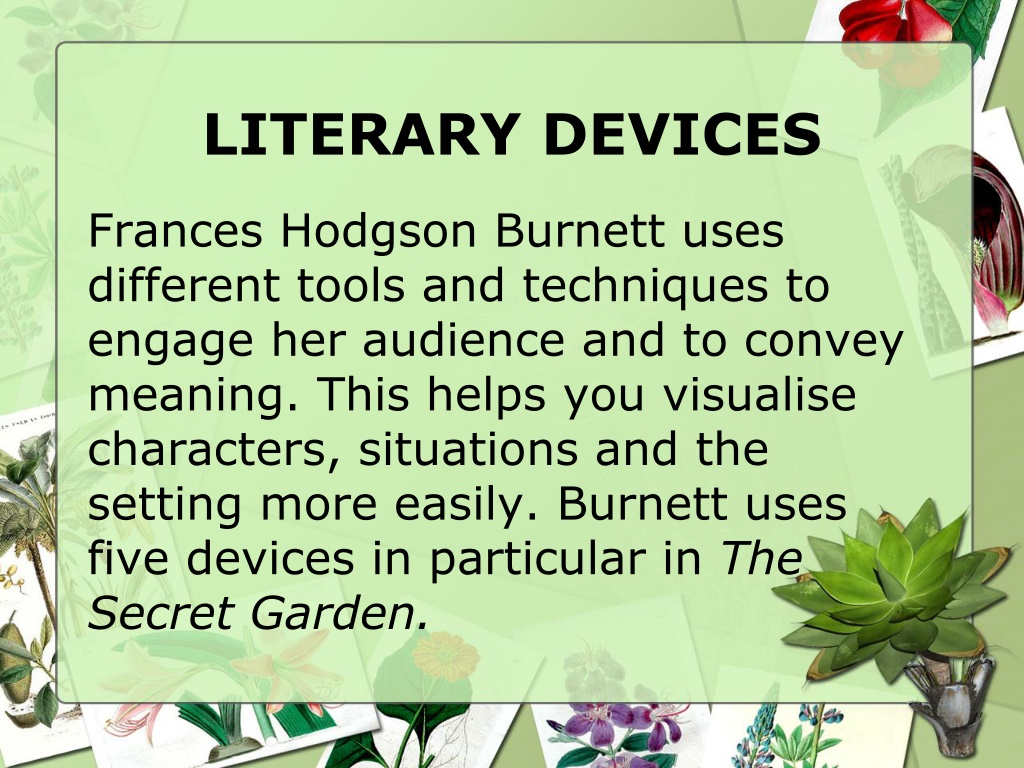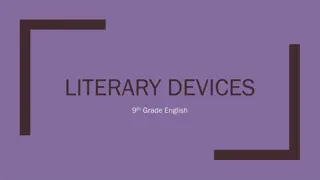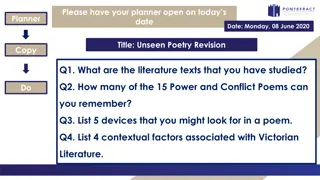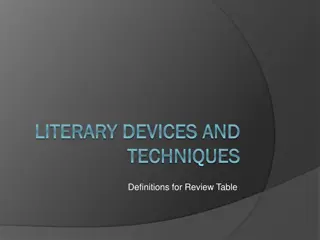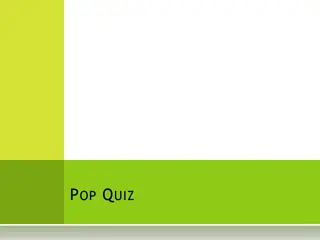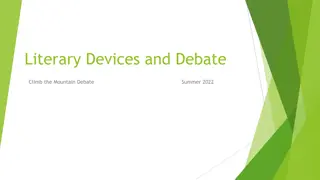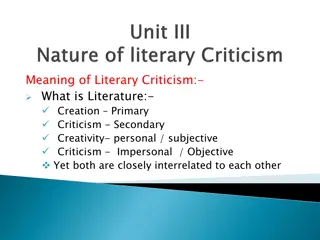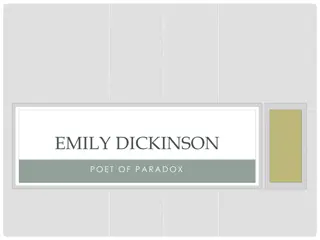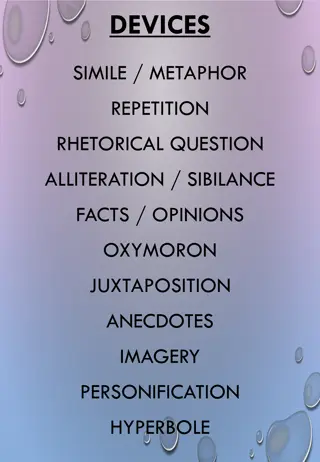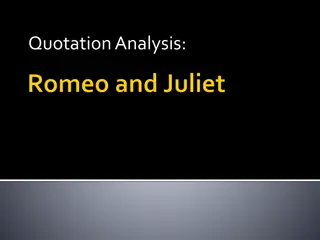Exploring Literary Devices in Frances Hodgson Burnett's Work
Frances Hodgson Burnett utilizes various literary devices, such as repetition and alliteration, in her novel "The Secret Garden" to engage readers and convey deeper meanings. Through examples and explanations, this article delves into how repetition and alliteration are employed to enhance the storytelling experience and emphasize key themes in Burnett's work.
Download Presentation

Please find below an Image/Link to download the presentation.
The content on the website is provided AS IS for your information and personal use only. It may not be sold, licensed, or shared on other websites without obtaining consent from the author. Download presentation by click this link. If you encounter any issues during the download, it is possible that the publisher has removed the file from their server.
E N D
Presentation Transcript
LITERARY DEVICES Frances Hodgson Burnett uses different tools and techniques to engage her audience and to convey meaning. This helps you visualise characters, situations and the setting more easily. Burnett uses five devices in particular in The Secret Garden.
REPETITION Repeating of a word or words or a sentence.
REPETITION EXAMPLES I shall get well! I shall get well!" he cried out. "Mary! Dickon! I shall get well! And I shall live forever and ever and ever! He can do it! He can do it! He can do it! He can! I shall live forever and ever and ever!" he cried grandly. "I shall find out thousands and thousands of things. I shall find out about people and creatures and everything that grows like Dickon and I shall never stop making Magic. I'm well! I'm well! I feel I feel as if I want to shout out something something thankful, joyful!
REPETITION EXAMPLES Big closed house and big bare moor and big bare gardens had made this one feel as if there was no one left in the world but herself. I think the roses have climbed and climbed and climbed until they hang from the branches and walls and creep over the ground almost like a strange gray mist. You can!" shouted Mary. "Half that ails you is hysterics and temper just hysterics hysterics hysterics!"
WHY USE REPETITION? Authors use repetition to: Make a point Link ideas Make things easier to follow Emphasise an idea To give the story a beat or rhyme
ALLITERATION This is the repetition of the first consonant sound in a series of words. We see a lot of alliteration with the character s names too. A tongue twister is an extreme example of alliteration.
ALLITERATION Eg. Mrs Medlock, Mistress Mary. Also, Misselthwaite Manor. Let s have a look at alliteration in a sentence.
ALLITERATION And here is the handle, and here is the door. Dickon push him in push him in quickly! And Dickon did it with one strong, steady, splendid push. Between the blossoming branches of the canopy bits of blue sky looked down like wonderful eyes.
WHY USE ALLITERATION? It focuses the reader s attention on a particular section of text Often the sounds mimic what is happening in the story: Form imitating content It may make the words flow more easily.
METAPHOR This is when the author writes about one thing in terms of another A comparison A figure of speech where something IS something else.
METAPHOR EXAMPLES Th' world's full o' jackasses brayin' an' they never bray nowt but lies. They're a pair of young Satans. Where, you tend a rose, my lad, a thistle cannot grow.
WHY USE METAPHORS? It helps the reader visualise a character or event more easily It makes writing more interesting They can be funny It makes the reader use their imagination we have to work! There may be no other way for the writer to explain what they want to say.
SIMILES This is when the author writes about one thing in terms of another using the word like or as A comparison A figure of speech where something is LIKE something else.
SIMILE EXAMPLES Big closed house and big bare moor and big bare gardens had made this one feel as if there was no one left in the world but herself. The children seemed to tumble about and amuse themselves like a litter of rough, good-natured collie puppies."
SIMILE EXAMPLES He's he's like an angel! He was not strong enough to throw it far and it only fell at her feet, but Mary's face looked as pinched as a nutcracker. There's not a lump as big as a pin!
SIMILE EXAMPLES I think the roses have climbed and climbed and climbed until they hang from the branches and walls and creep over the ground almost like a strange grey mist. You smell like flowers and and fresh things. The garden had reached the time when every day and every night it seemed as if magicians were passing through it drawing loveliness out of the earth and the boughs with wands.
SIMILE EXAMPLES He felt as if tight strings which had held him had loosened themselves and let him go. A lamb a lamb! A living lamb who lay on your lap like a baby! The things we've gone through to get him to go out in his chair would leave a body trembling like a leaf. Tha'rt as thin as a lath an' as white as a wraith, but there's not a knob on thee.
WHY USE SIMILES? It helps the reader visualise a character or event more easily It makes writing more interesting They can be funny It makes the reader use their imagination we have to work! There may be no other way for the writer to explain what they want to say.
PERSONIFICATION This is when the author gives human qualities to inanimate objects Giving human characteristics to something non-human
PERSONIFICATION EXAMPLE She ran only to make herself warm, and she hated the wind which rushed at her face and roared and held her back as if it were some giant she could not see. But the big breaths of rough fresh air blown over the heather filled her lungs with something which was good for her whole thin body and whipped some red color into her cheeks and brightened her dull eyes when she did not know anything about it.
PERSONIFICATION EXAMPLE And the roses the roses! Rising out of the grass, tangled round the sundial, wreathing the tree trunks and hanging from their branches, climbing up the walls and spreading over them with long garlands falling in cascades they came alive day by day, hour by hour. Fair fresh leaves, and buds and buds tiny at first but swelling and working Magic until they burst and uncurled into cups of scent delicately spilling themselves over their brims and filling the garden air.
PERSONIFICATION EXAMPLE Mary, when it's quite early and the birds are just shouting outside and everything seems just shouting for joy even the trees and things we can't really hear I feel as if I must jump out of bed and shout myself. If I did it, just think what would happen! Magic is always pushing and drawing and making things out of nothing.
WHY USE PERSONIFICATION? It helps the reader understand To increase your attention Makes sentences more interesting Boost emotion Make their writing come to life Might make it more relatable
